Cats, beloved for their independent yet affectionate nature, often baffle their owners with peculiar behaviors, one of the most puzzling being their nighttime antics. Many cat owners have been woken up or been kept awake by their feline friends racing around the house, playing with toys, and causing a ruckus seemingly out of nowhere in the middle of the night. This article aims to delve into the unique nocturnal behavior of cats, answering the frequently asked question: “Why do cats go crazy at night?”.
Behaviors They Exhibit
Cats exhibit a wide array of behaviors during their nighttime escapades. They may suddenly start to sprint from one end of the house to the other, make loud noises, jump on furniture, or engage in hyperactive play. Some cats may also become excessively vocal, meowing, chirping, or even hissing without any apparent reason. Other behaviors can include intense hunting, chasing, or pouncing – often aimed at unsuspecting toys, or in some cases, their owner’s feet. Even the most placid feline during the day can turn into a wild creature when the lights go out. [1]
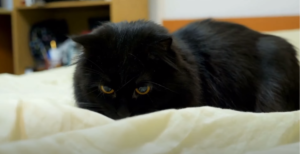
Reasons For Kitty Hijinks
Various factors can contribute to the escalation of your feline companion’s behavior when night falls:
Being Home Alone And Sleeping All Day
One of the primary reasons for a cat’s nocturnal shenanigans is that they’ve often spent the majority of the day home alone, sleeping. Cats are crepuscular creatures, exhibiting heightened activity during the magical hours of dawn and dusk. When their owners are not around, they tend to spend the daytime hours in slumber, leading to an excess of energy as the sun sets. Additionally, the quiet of the night might also be more appealing to them, making it the perfect time to explore, play, and exhibit their hunting instincts. If your cat is home alone and sleeps all day, it’s natural for them to unleash this pent-up energy once you’re home or during the night when the house is quiet. [2]
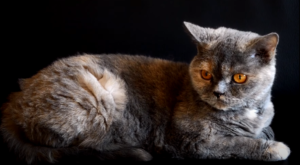
Hunger
Another common reason for your cat’s midnight antics could be hunger. Unlike humans who typically eat three large meals a day, cats in the wild tend to have multiple smaller meals throughout the day and night, often corresponding to their hunting successes. Domestic cats may still retain this instinctual feeding pattern. If their last meal was early in the evening, by the middle of the night, they could be feeling hungry again and become active in search of food. This is particularly true if your cat is on a diet or if their meals are not satisfying enough. If it’s hunger causing the nighttime chaos, you may want to consider adjusting their feeding schedule or providing a small, late-night meal. It’s always best to consult a vet before making significant changes to your cat’s diet.
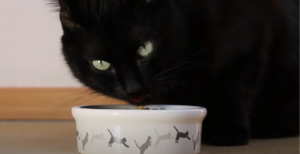
Your Cat Is Bored And Wants To Play
Just like humans, cats can also get bored, and this boredom can lead to increased activity at night. If your cat doesn’t have enough toys or stimulating activities during the day, they might turn to you for entertainment when you’re trying to sleep. Cats need mental and physical stimulation to keep them happy and healthy. Toys that mimic prey, like mice or birds, can provide hours of amusement. Puzzle feeders, which dispense food as your cat plays with them, can also keep them engaged and slow down their eating. Similarly, interactive play with you can be an excellent form of exercise and a great way to bond with your cat.
[3]Hyperactivity Burst
Cats, like many other animals, experience episodes of increased energy and activity known as “hyperactivity bursts,” particularly noticeable at night. This sudden burst of energy can cause your cat to race around the house, pounce on invisible prey, and generally behave like they’ve been possessed. This can be attributed to their primal instincts, especially the instinct to hunt. In the wild, cats use these bursts of energy to chase and capture prey. Even though domestic cats are well-fed and don’t need to hunt for their meals, these instinctual behaviors can still manifest as nocturnal episodes of hyperactivity. These bursts are usually short-lived and are a normal part of feline behavior. Providing active play sessions during the day can help manage these nighttime outbursts.
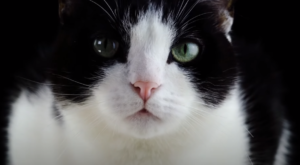
It Could Be An Infestation Or Health Challenge
Sometimes, the cause of your cat’s nighttime antics could be due to an infestation or a health challenge. Parasites like fleas or worms can make your cat restless, leading to increased activity at night. A health issue could also manifest itself in the form of excessive nighttime activity or disturbances in their normal sleep patterns. For instance, hyperthyroidism, a common condition in older cats, can cause an increase in energy levels, resulting in more active behavior. Similarly, cognitive dysfunction syndrome, similar to Alzheimer’s in humans, can cause confusion and restlessness, particularly at night. If you suspect that your cat’s nocturnal behavior stems from a medical problem, it is imperative to seek advice from your veterinarian. A comprehensive examination can be conducted to eliminate any possible health issues and provide guidance on effectively managing your cat’s behavior. [4]
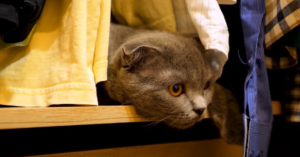
How Can You Stop Your Cat Running Around At Night?
There are several strategies you can implement to discourage your cat from running around at night:
Adjust Feeding Times: Serve your cat their main meal just before you go to bed. This aligns with their natural cycle of hunting, eating, grooming, and then sleeping. A satisfying meal could make them more inclined to sleep during the night.
Provide Stimulating Toys: To ensure your cat remains engaged and expends energy during the day, provide them with a variety of stimulating toys. Interactive toys that challenge their cognitive abilities and require effort to obtain rewards are particularly effective in keeping them entertained.
Create A Comfortable Sleeping Environment: Make sure your cat has a comfortable, warm place to sleep. If they have a favorite sleeping area, try to make it as inviting as possible to encourage nighttime sleep.
Play With Your Cat Before Bed: Before retiring for the night, ensure to indulge your feline companion in an energetic play session. Once they’ve expanded their energy, they’re more likely to sleep through the night.
Keep Your Cat Active During The Day: Encourage your cat to stay active during the day to promote a restful night’s sleep. This could involve playing with them, encouraging them to use a cat tree, or even taking them for supervised outdoor explorations.
Consult a Vet: If after trying these strategies your cat still exhibits nighttime hyperactivity, it may be worth consulting your vet. They can eliminate any potential health concerns and potentially offer additional guidance.
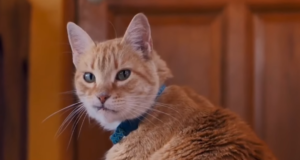
Remember, every cat is unique and what works for one might not work for another. Patience, understanding, and a bit of trial and error can go a long way in helping you and your feline friend enjoy peaceful nights. [5]
FAQ
How do I stop my cat from acting crazy at night?
To stop your cat from acting crazy at night, consider implementing a few strategies. First, adjust their feeding times, so their main meal is right before your bedtime. This can help align with their natural hunting, eating, grooming, and sleeping cycle. Second, ensure your cat has plenty of stimulating toys to keep them occupied during the day, which could make them more tired at night. Next, ensure that you create a cozy and inviting sleeping environment for your furry friend, making their favorite sleeping area as comfortable as can be. Engage in vigorous play sessions with your cat before you go to bed to help them expend energy and encourage sleep. If these strategies fail to produce results, it is advisable to seek advice from a veterinarian to eliminate any possible underlying health concerns.
Why do cats randomly act crazy?
Cats may exhibit sudden bursts of energy known as ‘zoomies’ or frenetic random activity periods (FRAPs). This behavior is common among various animals and serves as a means for them to expend surplus energy. For cats, this can often involve running at high speeds, pouncing on imaginary prey, or bouncing off walls. This behavior is especially evident in younger cats and kittens, as they are bursting with energy that needs to be expended. Another reason cats might act crazy is their instinctual hunting behavior. Domestic cats exhibit ‘crazy’ behavior, reminiscent of their wild ancestors, particularly during dawn and dusk when their prey is most active. This behavior is completely normal and is a sign that your cat is healthy and has a strong instinct. If you observe abrupt alterations in your cat’s behavior or heightened levels of activity and restlessness, it would be prudent to seek advice from a veterinarian to eliminate any possible health concerns.
Why does my cat turn evil at night?
Cats may seem to “turn evil” at night due to their inherent nocturnal nature. These animals are crepuscular, indicating that they exhibit peak activity during the periods of dawn and dusk. This behavior, often labeled as ‘evil’, can manifest as sudden bursts of energy, darting around the house, and engaging in playful or even aggressive actions. This is often just your cat’s instincts kicking in – in the wild, cats hunt at night, so domestic cats still have this built-in drive for nocturnal activity. Another factor could be boredom. If your cat spends the whole day sleeping, they might be bursting with energy during the night. To minimize this issue, make an effort to keep your cat engaged and active during the day by providing playtime and mental stimulation. If the behavior becomes problematic or you notice extreme aggression, consult a veterinarian to rule out any potential health issues.
Why do cats get hyper at 3am?
Cats often exhibit hyperactive behavior at 3 am due to their natural crepuscular nature. This means they are most active during the twilight hours of dawn and dusk. The middle of the night, around 3am, often aligns with their instinctual hunting times. In the wild, this would be an optimal time to hunt due to decreased visibility for their prey. In a domestic setting, cats may display this hunting drive through play and exploration. Additionally, if your cat has been sleeping all day, they could simply be full of energy. Changes in the household, such as altered feeding times or lack of stimulation during the day, could also contribute to this behavior. To help manage this, try engaging your cat in stimulating play during the day and feeding them closer to your bedtime to encourage sleep during the night. As always, if this behavior is sudden or causes concern, consult your vet to rule out any possible health issues.
Is it cruel to lock cats out at night?
While some owners may think it’s beneficial to lock cats out at night to allow them to explore and expend energy, it’s generally not recommended. Cats locked outside at night are exposed to many risks including traffic accidents, fights with other animals, and harsh weather conditions. They might also be a nuisance to neighbors. Furthermore, nocturnal solitude could cause stress and anxiety, particularly for indoor cats not accustomed to the outside environment. Providing a stimulating indoor environment with toys and climbing structures, accompanied by some interactive playtime, can satisfy your cat’s instinctual behaviors safely. If you have concerns about your cat’s night-time activity, consult with a vet or a pet behaviorist to explore more suitable alternatives. It’s important to prioritize your cat’s safety and well-being while also respecting their instincts.
Why is my cat running around like a maniac?
Cats are notorious for their occasional bursts of energy, commonly referred to as ‘zoomies’. This typically occurs due to a sudden burst of energy which they need to release. Zoomies are particularly prevalent among kittens and youthful cats, brimming with an excess of energy. This behavior is also triggered by your cat’s inherent hunting instincts. Even though your cat is domesticated, they still retain the instincts of their wild ancestors. Running at high speeds helps cats sharpen their hunting skills, offering both physical exercise and mental stimulation. Another factor could be boredom, particularly if your cat has been inactive or sleeping for a long period. If you observe your cat frequently engaging in erratic prancing or displaying unusual behavior, it would be wise to seek the guidance of a veterinarian to rule out any potential underlying health concerns. Remember, each cat is unique and while zoomies are normal in moderation, changes in behavior should not be overlooked.
Why do cats sleep on you?
Cats often choose to sleep on their owners for various reasons, the most common being a show of trust and affection. As independent creatures, a cat choosing to sleep on you signifies a strong bond, recognizing you as a source of comfort and safety. The warmth of your body can also be particularly enticing to cats, providing a cozy and secure spot for them to snooze. Moreover, cats are territorial creatures and by sleeping on you, they are marking you with their scent, declaring to other cats that you are their territory. Keep in mind that each cat is one-of-a-kind, so it’s crucial to pay attention to their individual preferences and behaviors. If your cat’s sleeping patterns undergo abrupt changes or appear to cause discomfort, it would be prudent to consult with a veterinarian or a pet behaviorist for guidance and advice.
How do you relax a crazy cat?
Relaxing an overly active or ‘crazy’ cat involves a combination of physical stimulus and environmental control. Engaging your cat in regular play sessions with interactive toys is a fantastic way to help them release excess energy. Use prey-like toys, such as a toy mouse or a feather wand, to stimulate their hunting instincts. A laser pointer can also provide an outlet for your cat’s energy, but always ensure there’s a physical toy at the end of the game so your cat feels a sense of accomplishment.
Creating a calm environment is also essential. Some cats may respond well to calming diffusers or sprays that contain synthetic feline facial pheromones. These products are designed to help cats feel more secure and reduce anxiety.
Consider incorporating touch therapy, such as petting or brushing your cat. Many cats find this soothing, and it can be a bonding experience between you and your pet. However, always watch your cat’s reactions and stop if they seem uncomfortable.
Feed your cat closer to bedtime. A full belly promotes better sleep and reduces nighttime restlessness.
Why is my cat running around like a maniac and meowing at night?
It is not uncommon to witness cats engaging in energetic play and vocalizing at night, which is often playfully referred to as the ‘night crazies’. This behavior can be attributed to their nocturnal instincts. Cats are crepuscular animals, most active during dawn and dusk, when their wild ancestors hunted. This behavior has been ingrained in their genes, and domestic cats often exhibit this through active play and vocalization, even in the middle of the night.
Moreover, your cat might be meowing because of hunger, attention-seeking, or even due to medical issues. They might be hungry and asking for food, or they could be feeling lonely and looking for your attention. In elderly cats, excessive meowing might be a sign of cognitive dysfunction or other health issues.
Can cats have ADHD?
While your hyperactive cat may appear to have ADHD, it is important to remember that this is a human condition that cannot be diagnosed in cats. However, if your cat is constantly active, easily distracted, or exhibits high impulsivity, it could be due to a variety of reasons such as high energy levels, boredom, or even medical issues. These behaviors could also be normal for young kittens who are naturally playful and curious. If the actions are extreme or causing concern, it is advisable to seek guidance from a veterinarian or animal behaviorist. They can rule out medical problems and provide strategies to manage your cat’s behavior. While we use human terms to describe these behaviors, they might not truly represent what’s happening from a cat’s perspective. Understanding your cat’s unique behaviors and needs is crucial to ensuring their well-being.
Why do cats have a mad half hour?
Cats often have a ‘mad half hour’ or ‘zoomies’, which refers to bursts of high energy. This behavior is typically observed in the early morning or evening, aligning with cats’ crepuscular nature. These spurts of energy are completely normal and serve multiple purposes. First, they allow cats to express their natural hunting instincts. Cats in the wild would usually exert bursts of energy to capture prey. In a domestic setting, this instinctual behavior manifests as short, intense periods of play. The ‘mad half hour’ allows cats to release accumulated energy after long periods of rest. Additionally, this behavior can be employed by cats to express joy or excitement and is especially common in kittens.
Useful Video: What Causes Cats Go Crazy at Night? Understanding Your Cat’s Nighttime Frenzy
Conclusion
Understanding and catering to your cat’s behavior, especially their nighttime antics, can greatly improve their overall well-being and your shared experience. Keep in mind that cats are naturally crepuscular creatures, indicating they are most active during dawn and dusk. This instinctual behavior is often displayed through energetic play and vocalization during these hours. Always ensure that your cat has enough stimulation during the day and a calm environment to help them relax. Regular feeding schedules aligned with your bedtime can also help reduce nighttime activity.
References:
- https://www.meowijuana.com/blogs/news/why-cats-go-crazy-at-night
- https://www.petcarerx.com/article/why-your-cat-goes-crazy-at-night/2938
- https://www.catscratching.com/articles/why-do-cats-get-the-zoomies-at-night
- https://www.thesprucepets.com/crazy-cat-554821
- https://www.petsittersireland.com/cats-run-around-night/


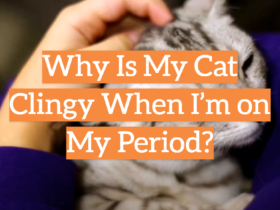
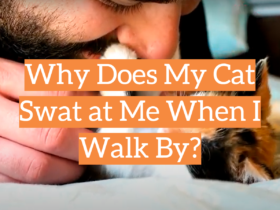
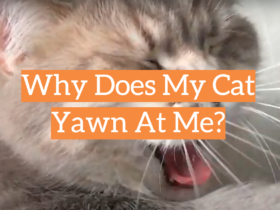
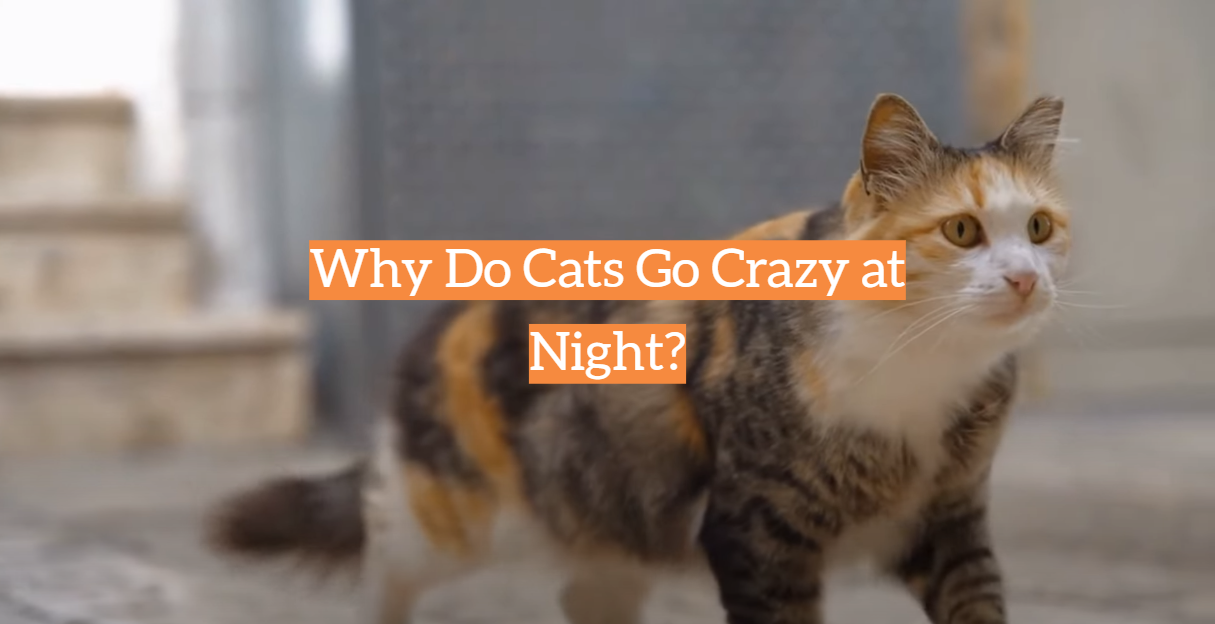
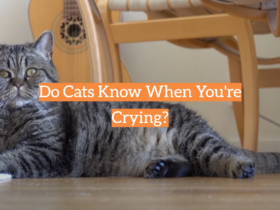

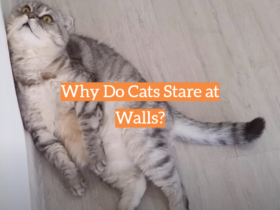
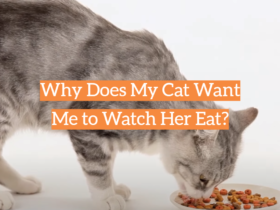
Leave a Reply